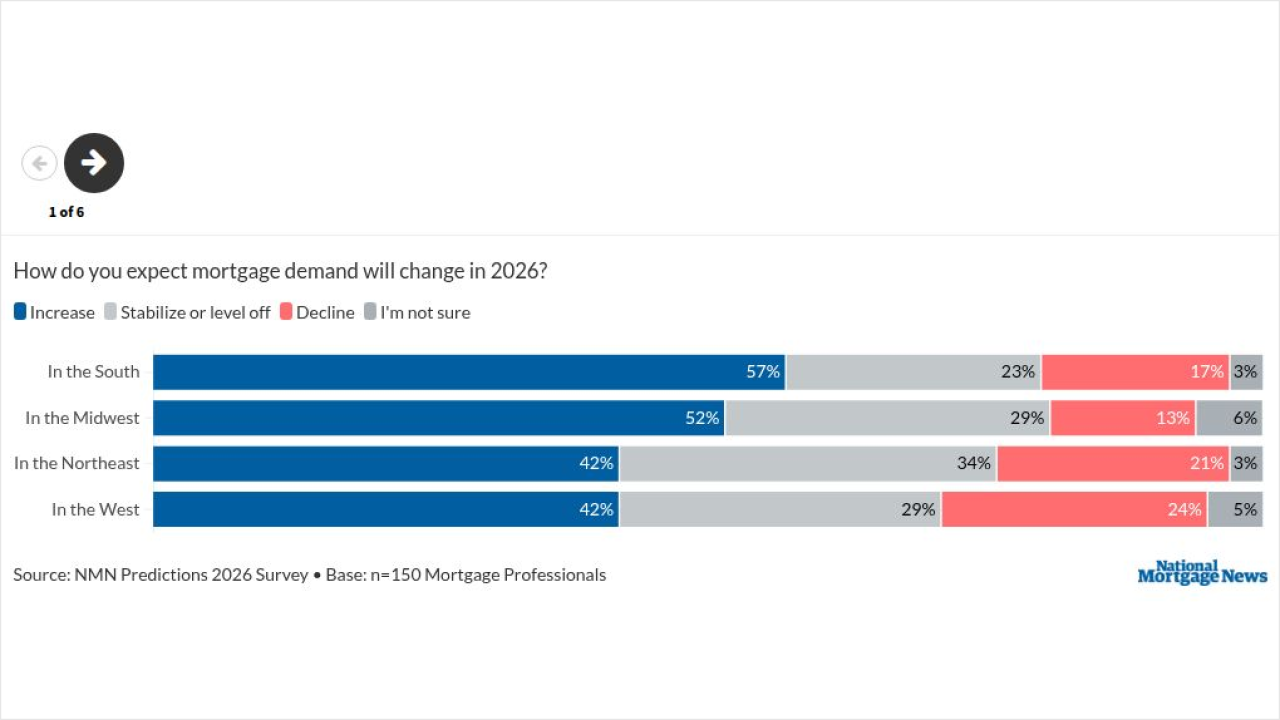Housing stakeholders warn climate risks are already influencing home sale activity and disturbing property values, sentiments shared by a larger portion of the mortgage industry.
The climate component has helped send
"When people find that these issues matter, and that they are real, we see an impact on prices, which shows us that consumers are responding," said Nicole Bachaud, senior economist at Zillow, during the Solutions for Affordable Housing event in Washington, D.C.
Lenders have been increasingly vocal about the impact of natural disasters on home loan activity. Flood insurance requirements and higher premiums have already made a dent in originations

Costlier property coverage could derail an applicant's debt-to-income ratio during the critical steps of a mortgage closing, lenders have cautioned. Just over half of mortgage professionals in an upcoming Arizent industry survey also said they anticipate natural disasters to disrupt the housing market next year via rising expenses and literal destruction.
Insurers have raised premiums for 23 consecutive quarters for a myriad of reasons, panelists explained. Inflation and larger legal payouts have piled onto rising claims. Insurance companies have also been less profitable because of weaker yields from pre-interest rate hike investments, said Thom Amdur, senior vice president of policy and impact at Lincoln Avenue Communities.
"There's a significant lack of third-party capital in the market as well, particularly on the reinsurance side," said Amdur. "Less competition means higher premiums as well."
While estimates vary, insurance solutions provider Quadrant Information Services puts the average U.S. homeowners insurance premium at $2,417 for a home priced around $350,000. Conversely, experts said there's no clear relationship between rate increases and geography. Adjacent properties can also have different risk profiles, so risks can't be measured broadly, said Peter Carroll, executive of public policy and industry relations at CoreLogic.
More than 80% of home shoppers consider climate risks when mulling a purchase, according to Zillow research in September. As home buyers move along climate lines, Bachaud warned of "blue-lining", a
"We really need to start focusing on how we can approach those communities," she said. "Through different funding sources, policies and programs that are really going to help those homeowners maintain homeownership and keep their wealth generation and equity."
To address the climate challenge, the economist pointed to
Amdur suggested new debt and equity products to encourage investments in resiliency and loss mitigation strategies similar to the government-sponsored entities'
Credit risk transfer investors could play a role in mitigating the impact to homeowners, Carroll said. Their pocketbooks are last to be hit by a natural disaster, experts explained, following exhaustion of payouts from insurers, taxpayer-funded aid resources and the homeowner's funds.
"Pulling together a reference pool that is triggered by a natural hazard event that could pay out and self-insure these losses that are being absorbed by homeowners increasingly, up the chain through servicers, and perhaps even some other counterparties, could be very productive," he said.
To learn more about housing professionals' thoughts on natural disasters, other threats to the industry and a game plan for 2024, read Arizent's 2024 Mortgage Predictions report out Jan. 4, 2024.



